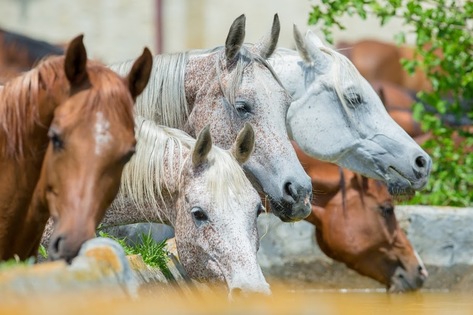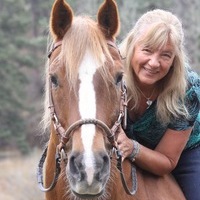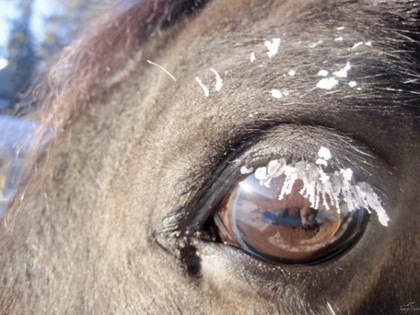
The Most Popular Horse Breeds Of 2019
Equestrian Advice & Guides General Equestrian
Build your business profile for FREE and expose your services to thousands of potential clients!
Create my profile now!
Winter in September, because…Colorado.
Here, living at 8500 feet in the Rocky Mountains, Winter comes whenever she feels like it and the temperature swing changes can range 50 or 60 degrees Fahrenheit. This year it happened earlier than usual and our temps dropped about 60 degrees in twelve hours. I wrote this advice for that first snow of the season a couple of weeks ago, but the information contained within is pertinent as we enter Fall and prepare for Winter, no matter where you live.
As most know, horses are not real hip on the barometric changes that accompany going from bloody-hot-miserable summer temperatures in the 90’s to the predicted lows in the 20's and 30's, along with the smoke from the fires burning here in the west. My head, my stomach, my throat, all are not feeling happy or normal, and since I feel it, I know the horses do, too. So here are some ideas if you are wondering what to do for the ponies for this storm or the next, especially if it’s sooner rather than later.
HAY/ROUGHAGE: Feeding more often and more in total quantity is the best way to keep your horse's tummy working with a smile and will keep him warm, too. Good grass hay is best--too much alfalfa and you can cause more harm than good unless this is what your horse is used to eating it.
I'm feeding more often and more total roughage. This means for yesterday and today, they've gotten Breakfasts 1, 2 and 3, but only a flake more than usual total. Lunch 1 is a flake split between three. Lunch 2 is two flakes split between 3. Dinner 1 is one flake each then Dinner 2 is in hay nets so they eat slower and is served at about 7-8 PM. Last night's second dinner was at 10.
Mine have already gotten their beet pulp and supplements today, the day before the storm, and it was laced with about a tablespoon of salt per horse. I also added a touch of sweetener in the form of their usual grain. They ate it in record time.
WATER: I cleaned the water trough already today and flipped the switch to turn on the heater. Mine is an auto waterer and it is that simple to heat or not heat, so why not? Horses prefer to drink warm water over cold in the winter and if it encourages them, I am all for it. Plus, I don't have to worry about frozen water, so that's a bonus.
BLANKETS: In a normal season change where summer goes to fall and then winter slides in once winter coats are in, I'm all for leaving the blankets off until it's either wet, windy or the temps/barometer plummet. But because it's technically still summer, my own horses are only barely fuzzing up--and Paizely is just now shedding. This means they don't have any hair to keep them warm for the short duration this storm will settle in, so I will blanket when the temps go below what they've been over the past couple of weeks. Luckily, here, our lows have been in the upper 30's and low 40's and highs are in the upper 80's. That's a huge swing and yet everyone has been fine. (knocking on wood)
You'll need to look at your own situation and decide what you feel is best for yours. Some things to consider are: Hair coat today--is it summer slick? Age of horse: Is he older? Condition of horse: If he's older or underweight, a blanket will help him maintain body heat. His living conditions: If he's in a stall, in a very warm barn, and is comfortably habituated to being in, he likely will be fine, but if the barn is cold, you're better to either blanket him or let him have room to move to keep his body temperature up and regulated.
TIMING: If you decide to blanket, this storm looks like it'll start warm, slow and with rain. Do what you've been doing for them; either nothing or maybe you use a sheet. Early tomorrow morning, it'll switch over to snow and the temps will drop somewhere along the line, too, so don't put those winter blankets on too soon, meaning that you may need to wake up in the wee hours to check, or dry them in the morning before blanketing. You'll know what is best for your horse based on what he's used to.
Blanketing for this storm, even if you never do, is not a bad plan IMO due to the severity of this event and the untimeliness of it. Horses simply aren't prepared. It's actually the barometer I worry about more than the snow or the temperatures. That thing starts dropping, mine will be getting blankets. I wonder if Siri can wake me for that? Ha!
SALT: Make sure your horse has good salt, not that 50 pound brick that comes in different colors--that's for cattle. Cows have extremely rough tongues. Horses do not. Think a cat vs a dog's tongue--the cat can take paint off a wall. The dog has to eat the wall by biting it. Himalayan rock salt is a nice choice as is any loose salt that the horse can dip into. Salt will help maintain him at a cellular level.
GRAIN: Do not increase the amount of grain you offer. Feed as usual. The roughage is what helps your horse more than the concentrates.
If you’d like to keep in touch or want to contact me directly, sign up here and be assured that I’ll send you very few direct emails and each will always include some FREE goody! Just click the very long link below and Welcome!
***This piece is not written to offer any legal, medical, or professional advice and should not be construed as veterinary advisory recommendation to you or anyone else. Please obtain professional instruction from a qualified person concerning your own objectives and needs.
Stay warm and let it snow, knowing your horses are warm and comfy, Happily Ever After!
~Tanya Buck

